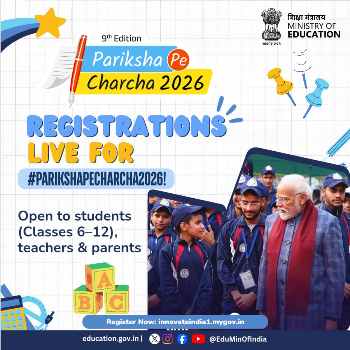Submit your essay for the Essay Writing Competition as a Tribute to Mahatma Gandhi by Gandhi Smriti and Darshan Samiti!
About the Competition
In celebration of the 155th birth anniversary of Mahatma Gandhi, the Gandhi Smriti and Darshan Samiti (GSDS), in collaboration with MyGov, is organizing a prestigious essay writing competition. The competition invites participants from all walks of life to delve into the life and ideas of Mahatma Gandhi and reflect on their relevance in today’s world. This competition is a unique opportunity to honor one of the greatest leaders of modern history through thoughtful discourse.

Competition Details
- Start Date: October 1, 2024
- Last Date: October 31, 2024, 11:45 PM IST (GMT +5.30 Hrs)
- Languages: Hindi and English
- How to Participate: Login through the MyGov platform to submit your essay.
The competition offers a platform for participants to explore Gandhi’s philosophies and consider how they can be applied to modern-day issues, ranging from climate change to digital activism.
Essay Topics
Participants can choose from the following topics, each focusing on a different aspect of Gandhi’s vision and its relevance in the 21st century:
- Gandhi’s Vision of Non-Violence in the Modern World
How can Gandhi’s principle of Ahimsa (non-violence) be applied to today’s conflicts and social issues? Essays may explore modern-day examples where non-violent methods have succeeded or consider how Gandhi’s teachings can be adapted to resolve contemporary global tensions. - Mahatma Gandhi and Climate Change: Lessons for Today
Gandhi’s ideas of simple living and self-sufficiency have newfound relevance in today’s fight against climate change. Essays can focus on how his lifestyle of minimalism can help address environmental challenges and promote sustainable living. - The Relevance of Gandhi’s Philosophy in Digital Activism
In a world where activism is increasingly digital, how can Gandhi’s principles of peaceful protest and civil disobedience guide online movements? Participants can explore how the philosophy of non-violence applies to social media campaigns and other forms of digital activism. - Mahatma Gandhi’s Role in Promoting Gender Equality
Gandhi’s work for the empowerment of women and gender equality was ahead of his time. Essays can reflect on how Gandhi’s actions for women’s rights continue to inspire today’s movements for gender equality and social justice. - Gandhi and Youth Empowerment: A Modern Perspective
Gandhi emphasized the power of youth in driving societal change. This topic invites participants to draw parallels between the youth movements during the Indian independence struggle and how today’s youth can be empowered to lead social and political reforms. - Gandhi’s Approach to Conflict Resolution: Its Relevance to International Relations Today
Gandhi’s emphasis on dialogue and non-violent negotiation holds valuable lessons for resolving today’s global conflicts. Participants can analyze the potential of Gandhian methods in international diplomacy and peace-building efforts. - Gandhian Economics in the Age of Consumerism
In an era of increasing consumerism, how can Gandhi’s critique of materialism and his advocacy for a self-sufficient, local economy offer solutions to modern economic challenges? Essays could focus on how these ideas can tackle economic inequality and foster ethical consumption. - Digital Satyagraha: Applying Gandhi’s Tactics in the Age of Social Media
How can the principles of Satyagraha (truth and non-violent resistance) be adapted to the digital age? Participants can explore how Gandhi’s tactics might be applied to peaceful resistance movements on social media platforms. - Gandhi’s Lessons on Ethical Leadership for Today’s Leaders
What can today’s political and business leaders learn from Gandhi’s style of ethical leadership? This topic invites reflections on Gandhi’s values of integrity, humility, and service, and how they remain vital for contemporary leadership. - Gandhi’s Legacy and the Quest for Social Justice in India Today
Gandhi’s principles of equality and justice have had a profound impact on India’s social justice movements. Participants can evaluate how his teachings influence current efforts to address caste discrimination, poverty, and inequality. - Mahatma Gandhi and the Idea of Unity in Diversity
Gandhi envisioned India as a pluralistic society where different cultures coexist harmoniously. This essay could examine the relevance of Gandhi’s vision in today’s polarized world and how unity in diversity remains a vital goal. - The Gandhian Model of Education: Relevance in Today’s Curriculum
Gandhi believed in a holistic model of education that emphasized character-building, vocational training, and self-reliance. Essays can explore how these principles could be integrated into modern education systems to create more inclusive and practical learning environments. - Reimagining Gandhi’s ‘Swadeshi Movement’ for the 21st Century
Gandhi’s call for Swadeshi (self-reliance) during the independence movement can inspire today’s efforts to support local economies. Participants can discuss how promoting local products and self-sufficiency could address the challenges of globalization. - Gandhi and Technology: Contradiction or Complement?
Gandhi was skeptical of technology’s impact on humanity. This topic invites essays on how his philosophy can be reconciled with the modern, tech-driven world, and whether technology can complement rather than contradict his vision of a simple, ethical life. - Gandhi’s Idea of ‘Sarvodaya’ (Welfare of All) and its Relevance in Tackling Global Inequality
Gandhi’s concept of Sarvodaya emphasized the welfare of all, especially the marginalized. Participants can reflect on how this idea could address global inequalities today, offering solutions to bridge the gap between the rich and poor.
Awards and Recognition
The top three winners in both the English and Hindi categories will be awarded books on Gandhi, providing further inspiration and knowledge on his teachings.
How to Register?
Interested participants can register through this link.
Deadline
The deadline for submission is October 31, 2024.






